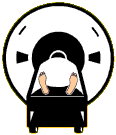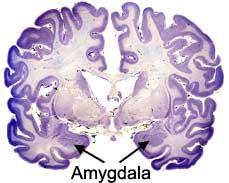 | Smaller Amygdala Size in Cocaine Addicts |
 November 23, 2004
November 23, 2004
The Amygdala, Cocaine and BehaviorMagnetic resonance imaging of the brain has revealed that the size of the amygdala in people addicted to cocaine is smaller than the amygdala in healthy adults. The amygdala is an area of the brain that plays a role in drug craving, emotional behavior and reward.
Cause or Effect?It is not known if cocaine causes the amygdala to shrink or if a small amygdala size increases the risk that people will become addicted to cocaine. Also, researchers do not know if people addicted to other drugs also have smaller amygdala sizes. If it turns out that a smaller amygdala size increases the risk that a person will become addicted to drugs, it may be possible for people to get a brain scan to examine the amygdala. Such a test might identify people at risk for drug addiction. |
Reference and further information:
|
| GO TO: | Neuroscience In The News | Explore the Nervous System | Table of Contents |
![[email]](./gif/menue.gif) Send E-mail |
 Fill out survey |
 Get Newsletter |
 Search Pages |
 Take Notes |
 This discovery was made by a team of researchers who studied the brains of
27 people addicted to cocaine and 27 age-matched control subjects. The
volumes of the right and left amygdala in cocaine addicts were reduced by
approximately 23% and 13%, respectively. The volume of the hippocampus,
another area of the brain measured by the scientists, was not different in
the two groups.
This discovery was made by a team of researchers who studied the brains of
27 people addicted to cocaine and 27 age-matched control subjects. The
volumes of the right and left amygdala in cocaine addicts were reduced by
approximately 23% and 13%, respectively. The volume of the hippocampus,
another area of the brain measured by the scientists, was not different in
the two groups.